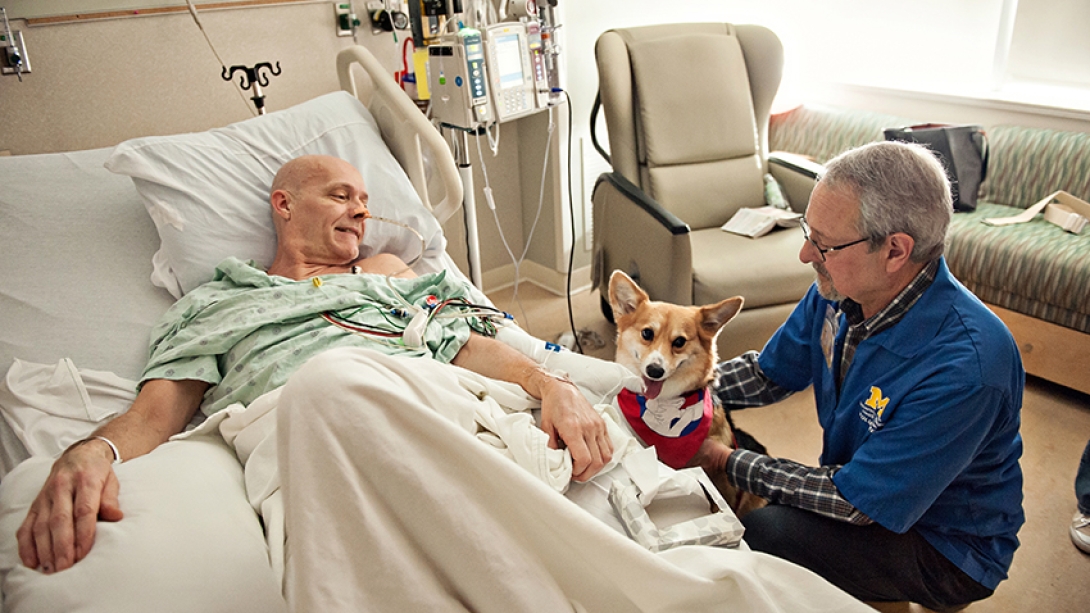A friendly therapy dog provides emotional support to patients at the Frankel Cardiovascular Center. Learn more about the animal’s special role in the healing process.
7:00 AM
Author |

Three days a week, Bree happily makes the rounds.
The energetic, 6-year-old Pembroke Welsh corgi is a frequent sight at Michigan Medicine. Her proud owner, Howard Rush, accompanies the four-legged visitor.
MORE FROM MICHIGAN: Sign up for our weekly newsletter
The duo are a part of Therapaws of Michigan Inc., a canine-assisted therapy program dedicated to promoting the human-animal bond.
That special connection has proved to be good medicine for patients. Since 1988, Therapaws volunteers and their canines have brought smiles and companionship to patients at Michigan Medicine facilities during scheduled visits.
Together, Rush and Bree visit University of Michigan C.S. Mott Children's Hospital, units 7A and 7B in the main hospital and the Frankel Cardiovascular Center. Traveling from room to room, they spend time with 10 to 15 patients during each visit.
For Rush, a retired U-M Medical School faculty member and veterinarian, the decision to volunteer his time, and that of his beloved Bree, was an easy one.
"After retiring, I considered volunteer options within the medical environment, and this seemed like a natural fit," he says, describing his pet as a "calm, friendly dog who loves to be around people."
Sharing the love
Rush sees the impact firsthand with every visit.
"The human-animal bond has a significant and well-documented impact on our emotions and our health," he says. "It's not uncommon for the children or grandchildren of a patient to be in the room when I arrive with Bree."
SEE ALSO: 6 Cool Things to Know About Mott's Child and Family Life Team
Children often are the first to greet the corgi, who Rush says "is very receptive to them and willingly accepts their attention."
Many patients are enthusiastic, particularly those who have dogs or cats at home and miss their pets. And, because dogs weighing less than 40 pounds are allowed in hospital beds, patients are thrilled to learn that Bree can snuggle up with them.
The therapeutic visits are rewarding for everyone involved.
"I try to get patients to tell me about their pets, past and present," says Rush. "We'll chat about different breeds and exchange stories. They find it to be a welcome distraction from the hospital environment and a great stress reliever."

Healing power
According to the Human-Animal Bond Research Institute, positive human-animal interaction has plenty of benefits.
It has been shown to influence blood pressure, heart rate and hormones correlated with well-being, including cortisol, oxytocin, prolactin and dopamine.
On a deeper level, therapy dogs "take in everyone's anxiety and emotions and really seem to calm people. It's one step closer to home," says the Rev. Lindsay Bona, manager of the Spiritual Care Department at Michigan Medicine.
"Nobody else gives you that unconditional love."
Still, the animal has incentives. At the end of each visit, Bree is rewarded with a few biscuits for a job well done, followed by a well-deserved nap when she gets home.
Photos by Leisa Thompson

Explore a variety of health care news & stories by visiting the Health Lab home page for more articles.

Department of Communication at Michigan Medicine
Want top health & research news weekly? Sign up for Health Lab’s newsletters today!





